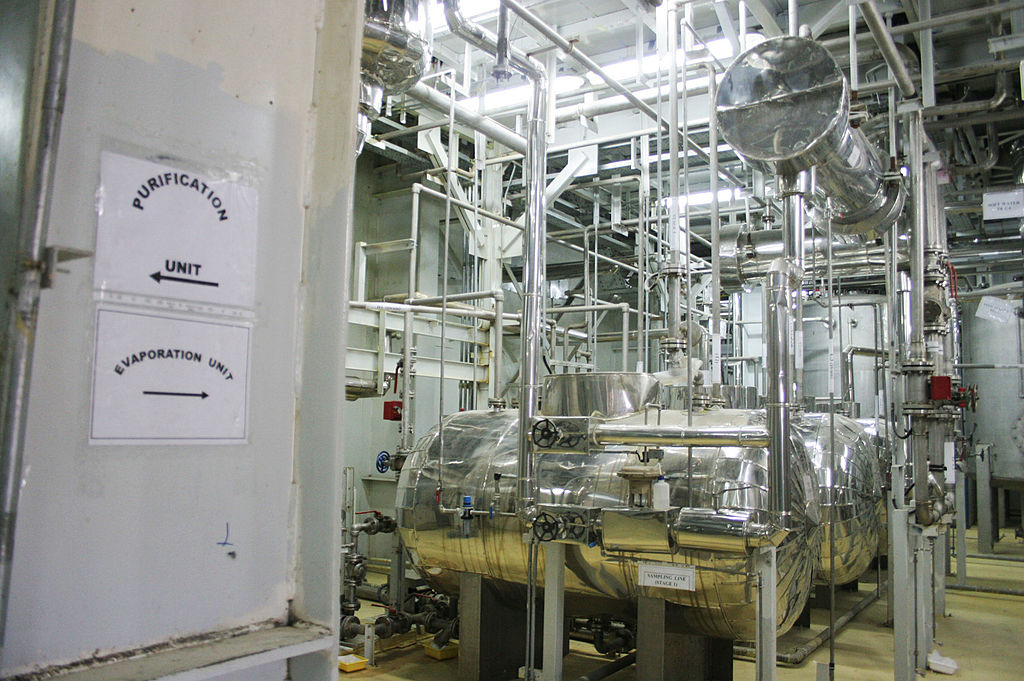
Indirect negotiations in Vienna between the United States and Iran about the 2015 nuclear deal (the Joint Comprehensive Plan of Action, or JCPOA) seem to be going nowhere. The Iranians apparently decided to leave the talks until after anti-Semitic hardliner Ebrahim Raisi, mass executioner of his own people, takes office as president, which happens this week.
Whatever the outcome of the Vienna talks, Iran appears to be only a whisker away from becoming a de facto nuclear state. This is the disturbing conclusion of a new study, Iran’s perilous pursuit of nuclear weapons, by David Albright, a former senior weapons inspector at the International Atomic Energy Agency (IAEA), and Sarah Burkhard from the Institute for Science and International Security.
Albright and Burkhard were granted unprecedented access to documents found in Iran’s secret nuclear archive, seized by Israel in 2018. Their new study is staggering because it proves beyond a shadow of a doubt that Iran’s allegedly ‘open’ civilian nuclear program is, in fact, its nuclear weapons project.
From the late 1990s, Iran operated the Amad plan—a multiagency government-sanctioned project to produce at least five atomic bombs—in blatant violation of its commitments under the Nuclear Non-Proliferation Treaty (NPT).
After being caught out in 2002, Iran hid Amad in plain sight by rebranding its weapons-related sites and activities as a ‘civilian’ program to produce fissile materials for energy and scientific uses under the Atomic Energy Organization of Iran (AEOI). The regime then claimed that its NPT-violating activities were based on its ‘undisputed’ right to nuclear energy for peaceful purposes under the treaty.
For instance, the Al Gnadir plant was built under Amad in the early 2000s to enrich uranium to military grade for one or two nuclear weapons per year. After it was uncovered in September 2009, the Iranians renamed it Fordow. It is now run by the AEOI.
Part of the price of making its nuclear program public, explain Albright and Burkhard, was that Iran would agree to IAEA monitoring or inspection of the sites ‘to defuse international condemnation’. A whole culture of fraud regarding this monitoring followed. The archive contains carefully organised files on methods for deceiving IAEA inspectors, with records up to 2006.
Then came the 2015 nuclear deal, in essence a trade-off legitimising Iran’s ‘open’ nuclear program in exchange for limitations on fissile material production capabilities, accompanied by invasive monitoring.
The aim of its Western signatories was to appease Supreme Leader Ali Khamenei and convince him not to order a breakout towards the bomb, at least for a while. The carrots for Iran were increased sustainability for the regime through the easing of sanctions—providing billions of dollars in Tehran’s coffers—as well as sunset clauses that gradually remove almost all the limitations on Iran’s nuclear enrichment capabilities beginning in 2025.
Iran violated its JCPOA commitments from day 1. Keeping the archive, the recipe book for creating an atomic bomb, was the gravest breach, and proof of Tehran’s actual intentions.
Meanwhile, the JCPOA ignored the two other legs of the Amad plan. The first, developing a warhead to carry the nuclear charge, remains clandestine. Former Amad head Mohsen Fakhrizadeh was in charge of this effort until he was killed in late 2020. While the extent of Iran’s progress is unclear, Albright and Burkhard suggest that Tehran has had the expertise to produce a warhead for decades.
The mullahs marketed Amad’s third leg, the means to deploy weapons of mass destruction on ballistic missiles, as part of country’s legitimate defence strategy. However, the fact that Iran is the only nation to develop a 2,000-kilometre-range missile without first developing a declared nuclear weapons capability exposes the real aim of Tehran’s missile program.
After withdrawing the US from the JCPOA in May 2018, President Donald Trump sought to apply ‘maximum pressure’ on Tehran through sanctions. The Iranians responded by gradually and carefully breaching various of their JCPOA obligations, slowly restarting the fissile materials arm of Amad.
The election of Joe Biden as US president last year appeared to be the golden opportunity the Iranian ayatollahs prayed for. Biden promised to negotiate a re-entry to the JCPOA.
How did the Iranians repay Biden for his eagerness to engage? With a vastly accelerated rate of JCPOA breaches. Armed with a renewed sense of confidence after surviving Trump’s sanctions campaign, the regime abandoned any pretence that it seeks civilian nuclear capabilities. Instead, it initiated a series of actions that can only be explained as related to nuclear weapons bomb—producing uranium suitable for the core of a nuclear bomb and enriching uranium to 60%. At the same time, Iran moved to undermine external supervision by increasing its harassment of IAEA inspectors, while removing electronic monitoring devices from nuclear sites.
The only conclusion possible is that engagement with Iran has failed. Today, it is on the verge of becoming a nuclear threshold country, weeks away from completing a bomb whenever the regime decides to do so.
Iran would benefit greatly from being a country on the cusp of becoming a nuclear weapon state. That would provide security for the unpopular regime at home and enable Tehran to freely pursue its program of destablisation across the Middle East, directly and through proxies.
Now is likely the last chance to prevent the regime from obtaining a nuclear weapons capability, which will leave it effectively invulnerable.
The international community will need coordinated measures to deter Tehran from proceeding with its plans. The aim of such measures must be to threaten the regime’s hold on power if it doesn’t change course. Such deterrence can be achieved through a wide range of deeper, ongoing sanctions, alongside a credible military threat.

